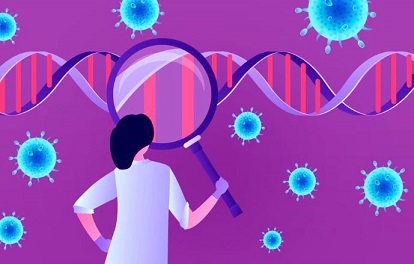Canadian researcher raises alarming questions about trustworthiness of viral sequences in the GenBank
Nilkhil Prasad Fact checked by:Thailand Medical News Team Aug 31, 2024 7 months, 3 weeks, 5 days, 16 hours, 39 minutes ago
A Canadian researcher from the University of Ottawa, affiliated with the Department of Biology and the Ottawa Institute of Systems Biology, has recently raised serious concerns about the trustworthiness of viral sequences stored in GenBank, a widely used genomic database. The research, spearheaded by Dr. Xuhua Xia, focuses on the reliability of SARS-CoV-2 genomic sequences and their potential impact on crucial studies related to public health including the developing of drugs, vaccines and comprehending the evolutionary aspects of the virus. This
Medical News report explores the findings and implications of Dr. Xia's research, highlighting the need for greater scrutiny and quality control in genomic data repositories.
 Canadian researcher raises alarming questions about trustworthiness of viral
Canadian researcher raises alarming questions about trustworthiness of viral
sequences in the GenBank
The Role of Genomic Data in Research
Genomic sequences play a pivotal role in various fields of biological and medical research. These sequences form the basis for understanding gene functions, protein interactions, and evolutionary relationships among organisms. In the context of the COVID-19 pandemic, the first SARS-CoV-2 genome submitted to GenBank was instrumental in developing vaccines and therapeutic interventions. However, the reliability of these sequences is paramount, as inaccuracies can lead to erroneous conclusions and potentially compromise public health initiatives.
Dr. Xia's study takes a novel approach to examine the authenticity of SARS-CoV-2 genomic sequences in GenBank. Unlike previous studies that primarily focused on detecting errors in genome annotation, Dr. Xia's research questions the validity of the sequences themselves. The study reveals that some SARS-CoV-2 genomes submitted to GenBank are highly improbable and may not be authentic!
Key Findings: Unreal Sequences in GenBank
Dr. Xia's analysis identified several SARS-CoV-2 genomic sequences in GenBank that are identical to the reference genome (NC_045512), despite being collected in different years and locations. These sequences, found in samples collected from 2021 to 2024, include those from the United States, India, and Mexico. The probability of these genomes being exact copies of the reference genome, given the expected rate of nucleotide changes over time, is effectively zero.
The study highlights specific cases where SARS-CoV-2 genomes, identical to the reference genome, were collected years after the original sample from December 2019. For example, a genome sampled in the United States on March 24, 2021, and another in India on January 11, 2024, are both exact copies of the reference genome. The probability of this occurrence is so low that it raises serious doubts about the authenticity of these sequences.
Implications for Research and Public Health
The presence of potentially unreal sequences in GenBank has significant implications for research and public health. Genomic sequences are used to trace the evolutionary history of viruses, identify mutations, and develop vaccines. If the data in GenBank is not accurate, it could lead to i
ncorrect conclusions about the virus's evolution, spread, and the effectiveness of vaccines.
One of the critical concerns highlighted by Dr. Xia is the lack of quality control in the submission process to GenBank. The study found that viral genomic sequences submitted to GenBank undergo minimal scrutiny, and critical information in the annotations can be changed without proper documentation. This lack of oversight means that researchers must often rely on the accuracy of the sequences without any means to verify their authenticity.
Call for Enhanced Quality Control
Dr. Xia's study underscores the urgent need for improved quality control measures in genomic databases like GenBank. The research suggests that even a low-power analysis can detect many unreal sequences, indicating that the problem may be more widespread than initially thought. To prevent incorrect conclusions and ensure the reliability of genomic data, there must be a concerted effort to implement stricter validation procedures for sequence submissions.
One of the proposed solutions is to enhance the verification process for new submissions to GenBank. This could involve cross-referencing new sequences with existing data, using advanced algorithms to detect improbable sequences, and maintaining detailed records of any changes made to the annotations. By improving the quality control process, GenBank can continue to serve as a reliable resource for researchers worldwide.
Conclusions: A Wake-Up Call for the Scientific Community
Dr. Xia's research serves as a wake-up call for the scientific community, emphasizing the importance of data integrity in genomic research. The findings suggest that some SARS-CoV-2 genomic sequences in GenBank may not be authentic, raising concerns about the reliability of studies that rely on this data.
The study calls for immediate action to enhance quality control measures in genomic databases to prevent the proliferation of incorrect or misleading data.
In conclusion, the research highlights a critical issue that could have far-reaching consequences for public health and scientific research.
The study findings were published on a preprint server but is currently being peer reviewed.
https://www.preprints.org/manuscript/202408.1963/v1
Keep logging on to Thailand
Medical News as we will soon be bringing more interesting exposes on the reliability and credibility of certain labs in Switzerland, United Kingdom, Japan, South Africa and the United States that are concerned with genomic studies of viruses and the maintenance of crucial databases and who is actually funding them and some of the interesting backgrounds of certain virologists, biostatisticians and variant hunters.
Read Also:
https://www.thailandmedical.news/news/breaking-covid-19-news-data-from-gisaid-could-be-unreliable-and-manipulated-platform-constantly-restricting-or-limiting-access-to-researchers
https://www.thailandmedical.news/news/breaking-china-no-longer-updates-sars-cov-2-genomic-sequences-on-international-gisaid-platform-will-only-use-its-own-genbase-platform 